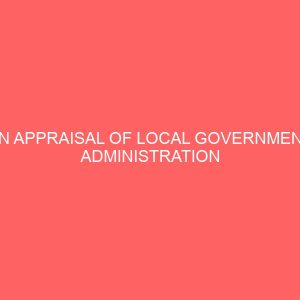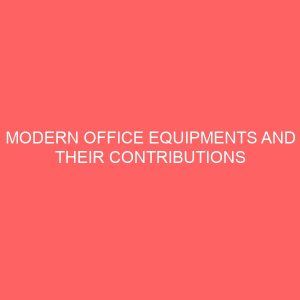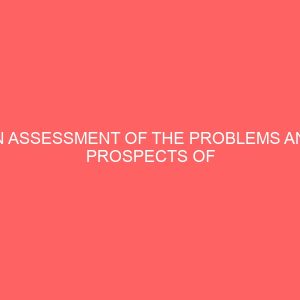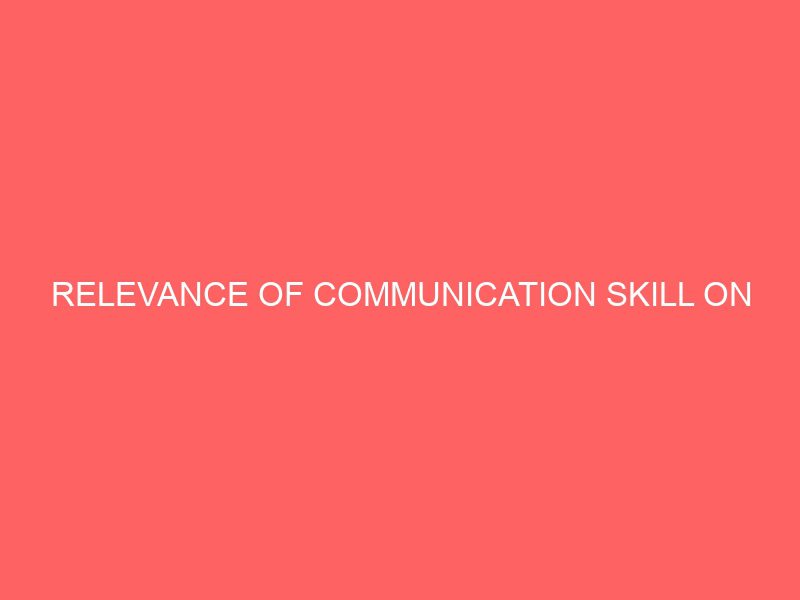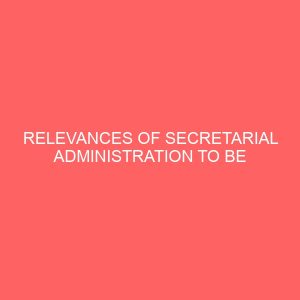Description
CHAPTER ONE
1.0 Introduction
1.1 Background of the Study
Communication is an indispensable administrative tool. It permeates every facets of organization. It is a crucial instrument of social interactions and a medium through which all relationships are established and maintained. Communication is the transmission of common understanding through the use of symbols. The term communication is derived from the Latin word. (Communis), which means ?to share? (Ezezue,2008:65). Sharing denotatively implies ?partaking? ?co-operating? hence it is a social activity, but unless a common understanding results from the transmission of symbols (verbal or non-verbal), there is no communication, (Donnelly, Gibson and Ivancerich, 1984:34). Effective managerial communication is strategic for organizational goal achievement.
Managers who are striving to become better communicators must accomplish two separate tasks first, they must improve their message ? the information they wish to transmit. Second, they must improve their own understanding of what people are trying to communicate to them; they must strive not only to be understood but also to understand others. While an organization has its physical setting, purpose and objectives, organization members have their individual objectives also. All these interplay in organizational setting, creating what we refer to as organizational climates.
However, ineffective communication in an organization may result in uncertainty, apprehension and dissatisfaction, these results to, poor productivity. It is therefore necessary that managers communicate with employees effectively. The extent to which a manager accomplishes corporate goals depends on his ability to communicate effectively (Herich, 2008). The fact remains that many executives still do not understand what communication is and its role in the success of an enterprise (Nnamseh, 2009:114). Effective communication enhances organizational relationship and minimizes strikes and lockouts. Administrative purposes and goals are sometimes defeated when communication is not effective. Wastes and costly mistakes have been made due to gaps in communication. From the above scenario, the need arises for a critical assessment of the role of communication in strategic management of organizations.
Communication is an indispensable function in achieving administrative goals. Getting the message across effectively and having it understood is a prerequisite to progress. There is no point in moving forward if the basic message is lost, or there are barriers in the process. This quickly reminds us of the biblical story of the construction of the Tower of Babel, the execution of which was a total failure because the builders could not communicate among themselves. Business organizations exist for the purpose of achieving predetermined goals and objectives. Actualization of these objectives ultimately requires a manager working with and through people. In this context, communication plays a vital role in the attainment of these goals. Its failure could then be traceable to poor application of communication. Incidentally, some managers do not often realize that communication is the vehicle that drives all the managerial functions. Success or failure of managerial functions depends to a great extent on the role of communication in the organization.
1.2 Statement of Problem
Organization cannot achieve its administrative effectiveness without communication. Communication which is one of the life sources of an organization is very necessary in an organization because without it people cannot interact with each other. For example if the employees in an organization would not know the organizations objectives, they would not strive to achieve the organization?s objectives. The following would also ensure as a result of problems in the communication structure of an organization.
i. The manger would not be able to inform employed of changes.
ii. The managers would not be able to train their worker reports so the worker not poses the skill they need to carry out their jobs.
iii. The employee in the organization would not know what their roles and responsibilities were so they would not be able to carry out their daily tasks and duties
iv. There would be dissatisfied customer?s at a result of poor customer?s service
v. The organization would not be aware of their computers activities.
1.3 Objectives of the Study
The major objective of this study is to determine the relevance of communication skill on administrative effectiveness. Other specific objectives include:
a. To evaluate the impact of communication in achieving the administrative effectiveness.
b. To find out the most suitable pattern of communication adopted by the organization.
c. To bring to the fore the barriers to effective communication.
1.4 Research Question
1) Is communication in an organization a necessary instrument for achieving administrative goals?
2) Are the communication modes and principles clearly understood and implemented by the management of Power Holding Company, Dugbe, Ibadan.
3) Can effective communication exist in every organization
4) Is communication the backbone in an organization
1.5 Significance of Study
The significance of the research study is as follows:
i. It provides realistic solutions to the problems or impediments to the development of communication skills in Power Holding Company of Nigeria, Dugbe District, Ibadan.
ii. It exposes the numerous problems or impediments to the development of communication skills in an organization.
iii. It exposes the level of communication in an organization
iv. Since the study exposes the level of communication development in Power Holding Company of Nigeria, Dugbe District, Ibadan, other organization are challenged.
v. It will serve as a guide to further research study
1.6 Scope of the Study
The study ?Relevance of Communication Skill on Administrative Effectiveness? in which Power Holding Company of Nigeria, Dugbe District, Ibadan is a case study area such as communication historical background measuring of communication, principles, introduction development of communication skills in PHCN, Ibadan.
1.7 Definition of Terms
Some of the terms used in this work are listed and defined below:
1. Effectiveness: is the capability of producing a desired result or the ability to produce desired output. When something is deemed effective, it means it has an intended or expected outcome, or produces a deep, vivid impression
2. Communication: The process of conveying information from a sender to a receiver with the use of a medium in which the communicated information is clearly understand the same way by both sender and receiver.
3. Communication Skill: The ability to convey information to another effectively and efficiently. Business managers with good verbal, non-verbal and written communication skills help facilitate the sharing of information between people within a company for its commercial benefit.
4. Effective: Producing a desired or intended result
5. Administrative Effectiveness: it is reasonable to consider whether alternative means exist for achieving the same ends. Control theory holds that organizations require mechanisms of control to ensure that members attend to organizational outcomes
6. Effective Communication: is a communication between two or more persons wherein the intended message is successfully delivered, received and understood.
7. Barrier: An obstacle that prevents communication, movement or access


